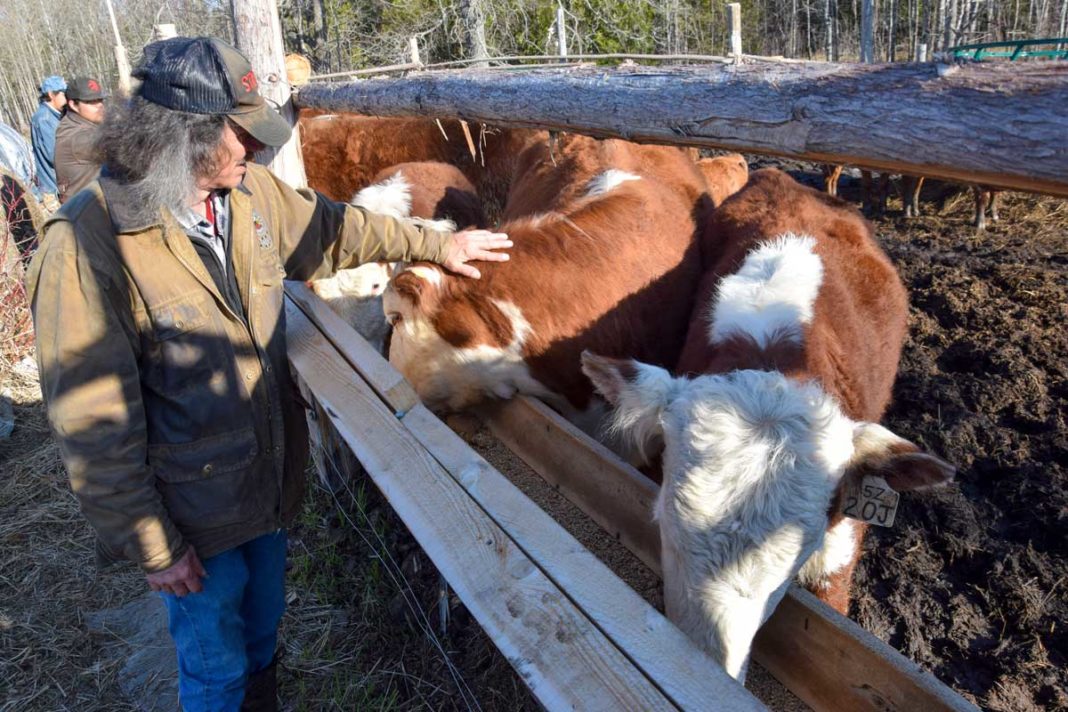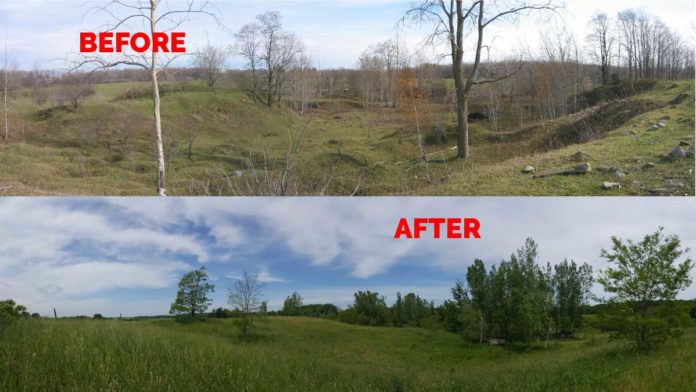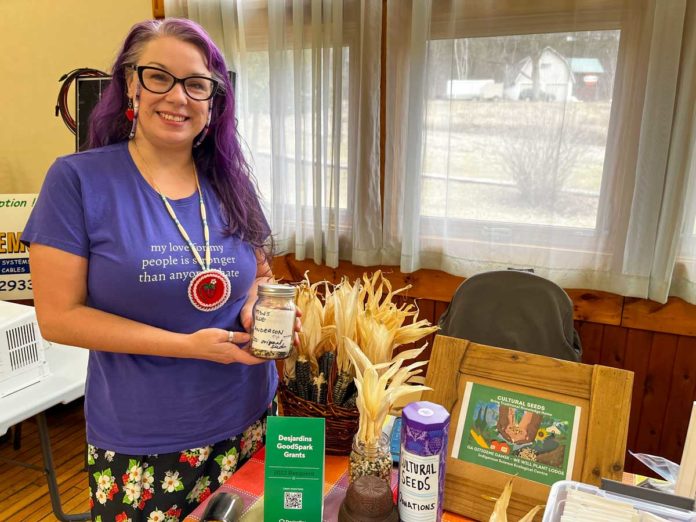WIIKWEMKOONG—It’s 8 am at the farm and Bossy the calf is hungry—very hungry. That fact is abundantly clear as the newborn eagerly gulps down milk from a large bottle held by Elijah Bell, one of several Wiikwemkoong Agricultural Services trainees who are helping to build a revitalized agricultural base in Wiikwemkoong Unceded Territory.
Bossy was stepped on by her mother at birth, twice.
“Her motherly instincts were somewhat lacking,” said program co-ordinator Annette Peltier-Flamand. “So, we separated Bossy from her mother and have nursed her back to health by hand.” Their efforts seem to have been successful, as the calf looks fairly robust now and the group hopes to reintroduce her to her mother. “We will have to keep a close eye on the mother to make sure that her stepping on Bossy was an accident,” said Ms. Peltier-Flamand. For now, Bossy has to make do with a bottle prepared from powdered milk, which doesn’t seem to bother her much, as she empties the bottle in just a couple of minutes.
The Wiikwemkoong Agricultural Services herd has grown to 26 head with the addition of a number of calves this season. Sadly, one calf was stillborn, but the new additions will mean the herd will continue to grow and prosper.
Program elder Ken Lewis calls the herd in from the far pasture. Led by the big boss momma cow, a long line of eager Herefords make their way down to the watering station and feed troughs. They know what his voice means in the morning. “They love their grain,” laughs Mr. Lewis, as he scratches the head of Curly. “Curly used to be my friend,” he said, “until she had a calf.” After that, the cow became standoffish and aloof. Still, she patiently puts up with the petting as she munches through the grain Mr. Lewis poured into the trough—signs of a possible rapprochement in the future.
The herd jostles for position at the trough. “They get a bit rowdy as the grain gets eaten up,” said Mr. Lewis.
Wiikwemkoong once had a thriving agricultural sector, with several herds on farms across the communities, but in recent years those operations have dwindled down to a mere handful, notes Mr. Lewis.
As the conversation continues, Mr. Bell and Patrick Neodagigie, along with post-secondary environment student Olivia Wemigwans, get ready for the day’s work.
Mr. Lewis, Mr. Bell and Mr. Neodagigie will be spending the day skidding logs out of the bush and milling them into lumber. “Doing it this way saves us a lot of money,” said Ms. Peltier-Flamand. Agricultural Services, a division of Wiikwemkoong Ontario Works, knows how to stretch a buck.
Ms. Wemigwans, on the other hand, is headed up to Wiikwemkoong High School to meet with the students of Marcel Recollet’s Green Environment class at the school’s greenhouse.
“We look after the starter plants for the class when they can’t be there, like on weekends,” notes Ms. Peltier-Flamand.
“Just about all of our equipment was purchased used off Kajiji,” she said. “We have gotten some really good deals.” The latest purchase is a must for any farm operation, a shiny almost-new tractor bearing a Wiikwemkoong logo on its hood. Other more battle-worn items include a seed drill that the group hopes to modify to accommodate till-less planting and a water trailer to deliver water to community members with gardens.
“The band supplies household water,” explains Ms. Peltier-Flamand, “but there is not enough for the gardens too, so we deliver water for community members to use for that purpose.”
The equipment quite often needs some TLC before being put into service, but they have a not-so-secret weapon in the form of Mr. Lewis. “I fix it all up so it all works good,” he chuckles.
One bright-blue coloured piece of equipment is a squeeze chute, a vital piece of equipment that makes it possible to inoculate and service the herd animals.
“We are trying to make as much of our equipment portable as we can,” said Ms. Peltier-Flamand. “That way we can take it around to help others in the community.”
One of the main impediments to revitalizing agriculture in the community has been the high cost of entry. Modern farm equipment is far from inexpensive. “We have lots of people expressing interest in getting involved,” said Ms. Peltier-Flamand, “but when they start to hear how much everything cost their eyes start to gloss over and they turn away.” By utilizing the power of community-ownership of the means of production, a kind of band-sponsored co-op approach, those entry costs are reduced dramatically.
Other projects being pursued successfully by Agricultural Services is a large garden located at Murray Hill, one of Wiikwemkoong’s satellite communities. Rows of cornstalks stand sentinel over the fields as Ms. Peltier-Flamand takes The Expositor on a tour. “The ground is still too wet to turn over,” she said. In the distance are large blue plastic containers capable of holding 1,500 gallons—one for watering the garden produce and another supplies a nearby washing station for cleaning potatoes and other produce.
“The pandemic made a lot of challenges for us,” she said, pointing to a series of numbered wooden stakes marking the end of the garden rows. Each family was given a numbered row to harvest, keeping them a safe distance from others.
The garden itself was planted by Agricultural Services and the seed drill helped make quick work of that particular chore.
Other projects in the offing include plans for a portable chicken processing plant. Although the poultry processed could not be used for resale, each family participating in a poultry program will be able to process their birds for personal use. “Hopefully, we can get funding for that soon,” said Ms. Peltier-Flamand.
One thing the pandemic did do that was positive was to provide awareness of just how fragile the food supply chain can be, she noted. “It really increased interest in producing locally-grown food,” she said. With the amount of good agricultural land in the community, there is little reason Wiikwemkoong could not become self sufficient—although much of that land has become fallow and overgrown with weeds and small trees.
“We just got get it brushed out and cleaned up,” said Mr. Lewis, not at all daunted by the prospect. “It’s good to be out on the land.”





